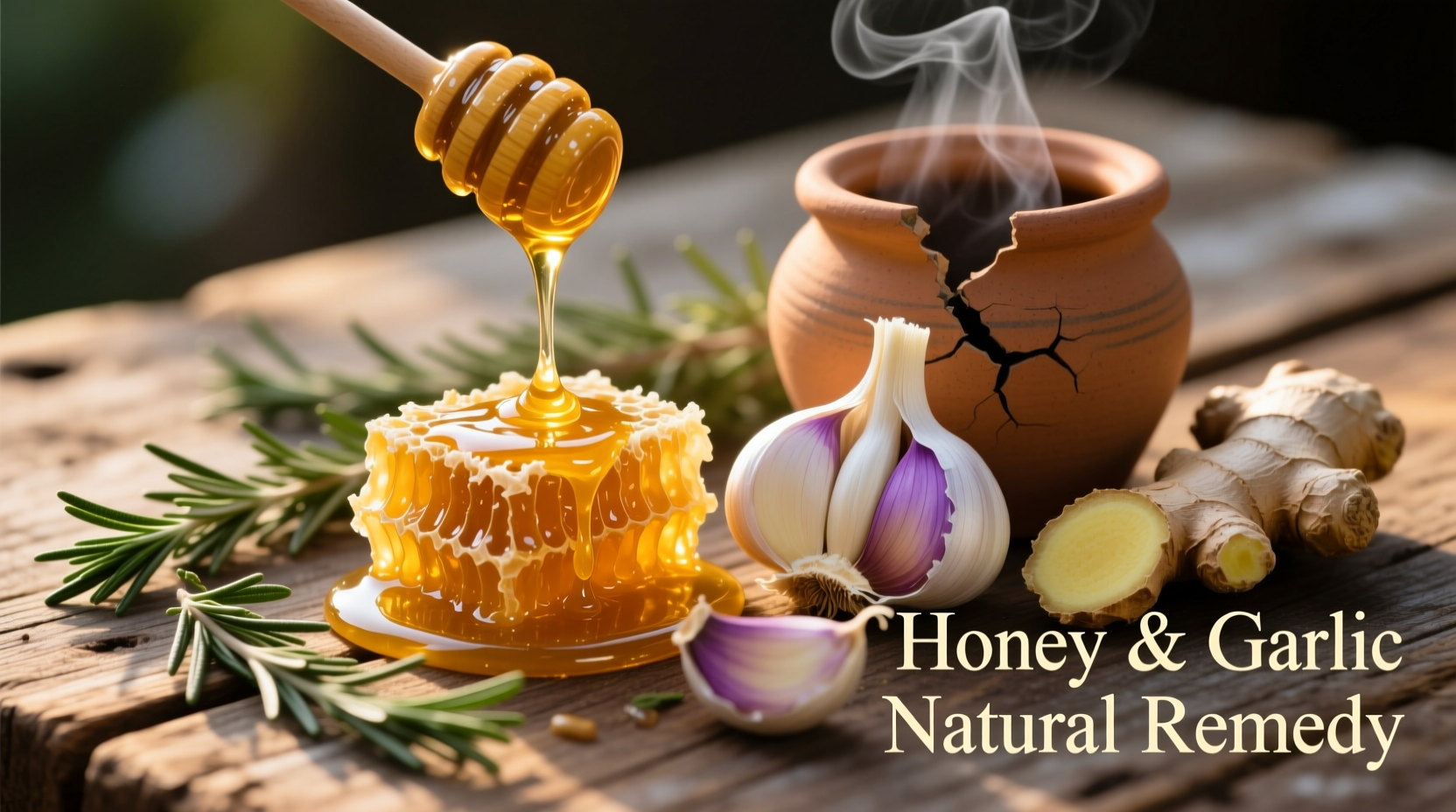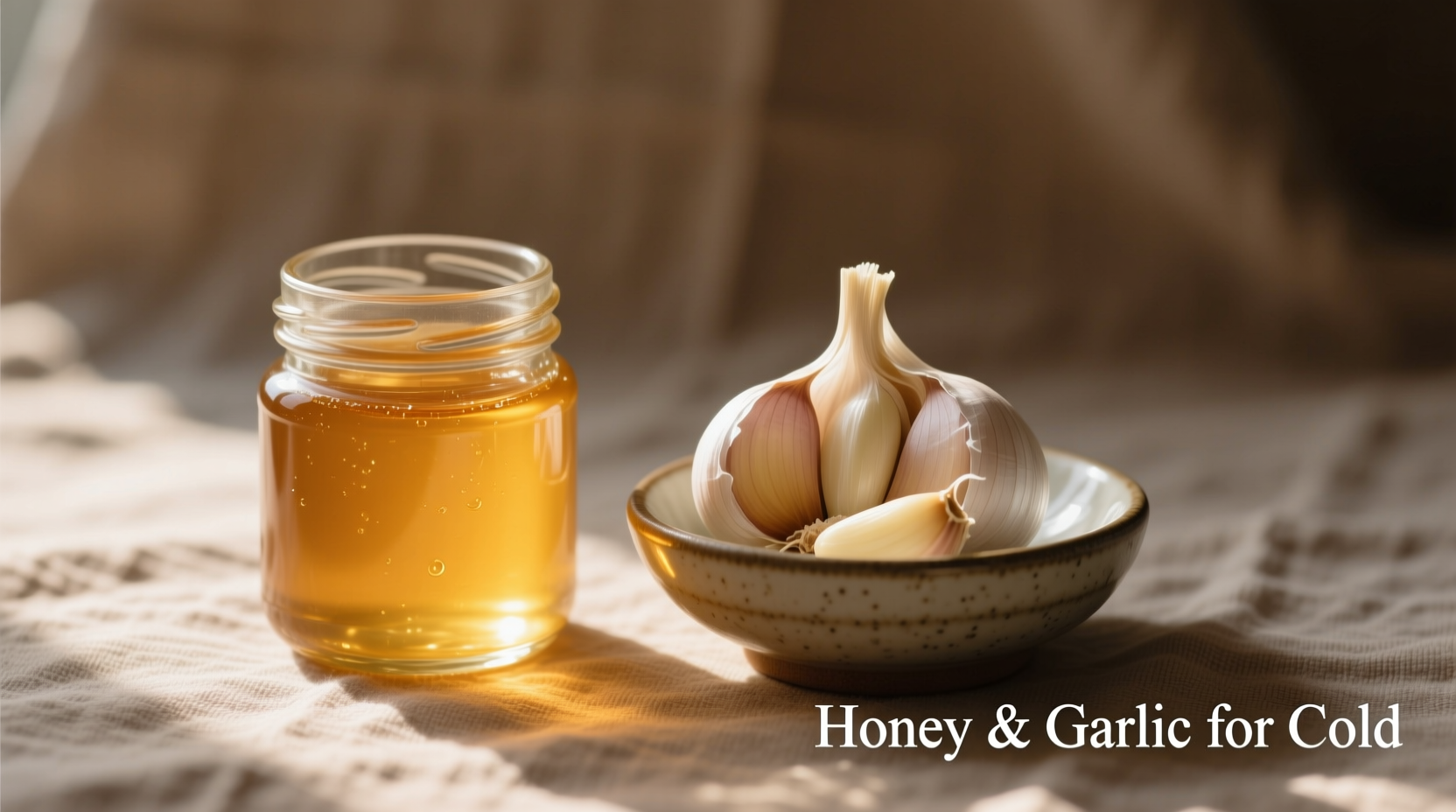Honey can provide effective relief for cough symptoms associated with colds in adults and children over 1 year old, while garlic shows limited but promising evidence for immune support. Neither cures a cold, but honey is clinically proven to reduce cough frequency and severity better than many over-the-counter medications, and garlic may help prevent colds when consumed regularly.
When cold season hits, many turn to natural remedies like honey and garlic for relief. As a culinary historian who's traced these ingredients' medicinal uses across centuries, I've seen how traditional wisdom often aligns with modern science. While neither honey nor garlic will cure your cold, they offer evidence-backed symptom relief that's stood the test of time.
The Science Behind Honey for Cold Relief
Honey's effectiveness for cough relief isn't just old wives' tale—it's clinically validated. The American Academy of Pediatrics now recommends honey as a first-line treatment for cough in children over 1 year, recognizing it outperforms many conventional cough medicines. A comprehensive Cochrane Review analyzing multiple studies found honey significantly reduced cough frequency and severity compared to no treatment or placebo.
| Remedy | Cough Reduction | Side Effects | Recommended For |
|---|---|---|---|
| Honey (2.5ml) | Significant improvement | None for ages 1+ | Children 1+, adults |
| Dextromethorphan | Moderate improvement | Drowsiness, dizziness | Adults, children 4+ |
| Placebo | Minimal improvement | None | N/A |
The thick consistency of honey coats irritated throat tissues, providing immediate soothing relief. Its natural antioxidants and mild antimicrobial properties may also support your immune response. For maximum benefit, take 1-2 teaspoons of raw honey before bed—studies show nighttime administration particularly reduces disruptive coughing.
Garlic's Role in Cold Prevention and Management
Garlic's reputation as a cold remedy spans millennia, from ancient Egyptian medical texts to traditional Chinese medicine. Modern research focuses on allicin, garlic's active compound formed when cloves are crushed or chopped. According to the NIH Office of Dietary Supplements, allicin demonstrates antimicrobial and immune-modulating effects.
A notable 2014 clinical trial published in Advances in Therapy followed 146 participants over 12 weeks. Those taking aged garlic extract experienced 21% fewer colds and recovered 1.5 days faster than the placebo group. However, the evidence remains limited compared to honey's well-documented cough benefits.
Practical Honey and Garlic Remedies You Can Try
When preparing natural cold remedies, timing and preparation matter. Here's how to maximize benefits:
Honey-Based Solutions
- Simple Honey Spoonful: Take 1-2 teaspoons of raw honey straight, especially before bedtime
- Honey-Lemon Tea: Mix 1 tbsp honey with warm water and lemon juice for sore throat relief
- Honey-Ginger Syrup: Combine honey with freshly grated ginger for added anti-inflammatory benefits
Garlic Preparation Methods
- Raw Crushed Garlic: Crush 1-2 cloves, let sit 10 minutes (to activate allicin), then swallow with honey
- Garlic Honey Infusion: Place peeled cloves in honey jar for 2-4 weeks before using
- Cooked Garlic: Add multiple cloves to soups and broths—cooking reduces potency but remains beneficial

Important Safety Considerations
While generally safe, these natural remedies have important limitations:
- Honey warning: Never give honey to infants under 1 year due to botulism risk
- Garlic sensitivity: Raw garlic may cause heartburn or interact with blood thinners
- Not a cure: These remedies address symptoms but don't shorten cold duration significantly
- Medical conditions: Consult your doctor if you have diabetes (honey's sugar content) or upcoming surgery (garlic's blood-thinning effects)
When to Seek Medical Care
Natural remedies work best for mild cold symptoms. Contact a healthcare provider if you experience:
- Fever above 101.3°F (38.5°C) lasting more than 3 days
- Symptoms worsening after initial improvement
- Difficulty breathing or chest pain
- Symptoms persisting beyond 10-14 days
Remember that honey and garlic complement—but don't replace—standard cold care like rest, hydration, and proper nutrition. For children under 6, the American Academy of Pediatrics recommends skipping over-the-counter cough medicines entirely and using honey (for ages 1+) as the preferred symptomatic treatment.
Frequently Asked Questions
Can honey and garlic cure a cold?
No natural remedy can cure the common cold, which is viral and must run its course. Honey provides proven relief for cough symptoms, particularly at night, while garlic may offer some immune support. Neither eliminates the cold virus, but honey significantly reduces cough frequency and severity better than many conventional medicines.
How much honey should I take for cold relief?
For adults, take 1-2 teaspoons of raw honey as needed for cough relief, preferably before bedtime. Children ages 1-5 should take ½-1 teaspoon, while children 6-12 can take 1 teaspoon. The American Academy of Pediatrics recommends honey as first-line treatment for cough in children over 1 year, noting it outperforms many conventional cough medicines.
Is raw garlic better than cooked garlic for colds?
Raw, crushed garlic provides the highest allicin content—the active compound with potential immune benefits. Let crushed garlic sit for 10 minutes before consuming to maximize allicin formation. However, cooked garlic still offers benefits through other sulfur compounds, and may be better tolerated if raw garlic causes stomach upset. For therapeutic use, 1-2 raw cloves daily is typical, but many find garlic honey infusions more palatable.
Can I give honey and garlic remedies to my child?
Honey is safe and recommended for children over 1 year for cough relief, but never give honey to infants under 12 months due to botulism risk. Garlic is generally safe for children over 2 years in food amounts, but raw garlic may be too harsh for young digestive systems. For children under 6, the American Academy of Pediatrics recommends avoiding over-the-counter cough medicines entirely and using honey (for ages 1+) as the preferred symptomatic treatment.











 浙公网安备
33010002000092号
浙公网安备
33010002000092号 浙B2-20120091-4
浙B2-20120091-4